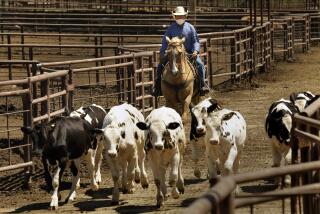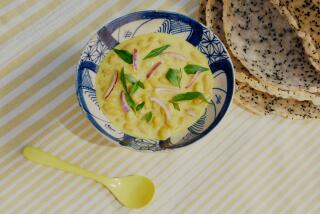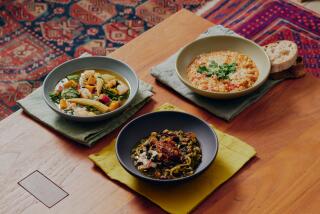Getting through the lobster feast as a vegan
On Sunday, four days into my monthlong vegan diet, I went to dinner with dear friends – 10 people who’d planned for many weeks to share a Chinese seafood feast.
Could I make an exception (a.k.a. cheat)? my son asked. I cannot say that wasn’t tempting. But not workable. I wasn’t ready to break this resolution, and I didn’t want to lie. Fortunately, the friend who planned the dinner just laughed and ordered extra tofu and vegetable dishes.
I tried not to look at the gorgeous mountain of lobster on the platter. It helped that wine is vegan.
It also helps that I can cook. I’ve been eating from my pot of “vegan soup,” made from what was in the fridge (potatoes, chard, carrots, celery and more) and added in some chickpeas for protein and wonderful pasta shells from the Los Angeles company Semolina Artisanal Pasta. I also love nuts. (Who could resist PB&J on whole grain bread?)
After I announced in The Times that I would track a month’s progress as a vegan, I got lots of advice and support from readers, too, such as trying “yogurt” made from almond or soy milk and some restaurants to try. (An online search turned up 60 vegan restaurants in Los Angeles.)
I also heard from people who were upset with me for saying my motivation was not animal welfare, and I heard about the health benefits of a vegan diet from the People for the Ethical Treatment of Animals. The Paleo diet proponents haven’t been in touch yet.
Which raises the question: Why would anyone be a vegan? (According to a 2011 Harris Poll, about 5% of Americans are full-on vegetarian, including vegans.)
The answers fall mostly into these categories: being healthy, protecting the planet (water use and greenhouse gas emissions from the meat industry), promoting animal welfare.
But vegans haven’t cornered the market on those issues, said Brian Kateman, a 25-year-old New Yorker who grew up eating a standard American diet.
“The question is not how can we can we increase the amount of vegetarians and vegans, but how can we reduce the amount of meat consumption,” said Kateman, who with a friend came up with the concept of reducetarians, people who are working to reduce the amount of animal food they eat.
“For a very long time I was committed to reduce my meat consumption, but I kept getting caught in situations in which I wanted to eat meat,” Kateman said by phone. Designations like “vegan” and “vegetarian” staged “a boxing match for moral superiority” that’s unproductive and does not focus on the shared commitment to eat less meat, he said.
Kateman’s is among several campaigns working to reduce meat consumption, including Meatless Monday and Veganuary. Some advocates, many of them foodies, suggest eating less meat but making it more eco-friendly -- grass-fed beef or humanely caught seafood.
It’s obvious that the environment and animal welfare are ethical concerns, but Stephanie Gray Winnard noted in an email that “living a healthy lifestyle is an ethical reason as well, because it’s wrong to be reckless with our health and treat our bodies with disrespect. It’s also wrong to be reckless with our health because our health affects others besides ourselves.”
It is true, however, that a vegan diet does not equal a healthful diet. I could eat artificially flavored, fatty chips washed down with sodas all day and keep my vegan cred. Obviously, that’s not a good idea. I plan to write about health and veganism later in the month. For now, a reader, Kathryn Cook, passed along this advice she’d once read: “Swedish Fish are vegan, but they’re not good for you. Don’t be a junk food vegan.”
Can I do it? Follow my progress @mmacvean and “like” Los Angeles Times Science & Health on Facebook.







